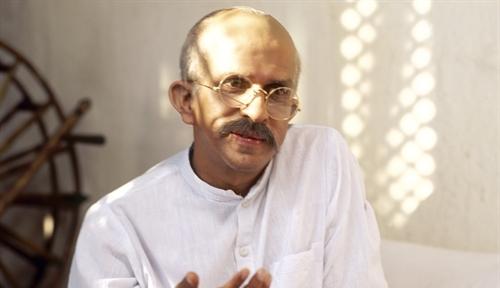Mohandas “Mahatma” Gandhi was India’s most important political and spiritual leader. He is honoured in India as Father of the Nation. His non-violent protests led to independence for India from the British. His beliefs and actions have inspired civil rights movements across the globe. He is an icon of world peace. His birthday, 2nd October, is commemorated worldwide as the International Day of Non-Violence.
莫罕达斯·卡拉姆昌德·甘地曾是印度举足轻重的政治和灵魂领袖。印度尊称他为“国父”。通过“非暴力”抵抗运动,甘地使印度摆脱英国统治。他的信仰和行动也带动了全球人权运动发展。甘地代表了世界和平。为了纪念甘地,将每年的10月2日定为国际非暴力日,这天也是甘地诞辰。
Gandhi was born in Gujarat, Western India, in 1869. He grew up surrounded by religious traditions of compassion, vegetarianism, and tolerance for all people. He got married at the age of 13. When he was 19, he went to London to study law. He returned to India to practice as a lawyer but was hampered by British officials, so he accepted a job in South Africa.
1869年,甘地出生在西印度古吉拉特。他成长在一个虔诚仁爱、素食、宽容的家庭。甘地13岁结婚。19岁那年,前往伦敦学习法律。之后回到印度成为律师,但遭到英国官员阻挠,不得不在南非另谋它业。

In South Africa, Gandhi faced discrimination and hardship wherever he went. He was treated as a third-class citizen by white people. This awakened in him questions about social justice and the role of the British in India. He returned to India in 1915, ready to put to work the concept of passive resistance he developed in South Africa.
在南非,甘地无论走到哪里都受到歧视和侮辱。并被白人当作“三等公民”。这些惊醒了甘地,并对社会公正和英帝国主义产生了质疑。1915年,甘地回国,并将其在南非所发展的“消极抵抗”发扬光大。
Between 1916 and 1945, Gandhi campaigned tirelessly to set India free from British rule. He started by leading protests against British taxes and landlords, and walked across India encouraging non-cooperation with the British. He was arrested and imprisoned for creating unrest. Gandhi's fame spread all over the nation. He was assassinated in 1948. Two years later, India became an independent republic.
1916-1945年,为了使印度摆脱英国统治,甘地付出了决绝努力。起初,他领导英国税法和地主反抗运动,并在全国宣讲,发动不合作运动。因发动暴乱,甘地被捕入狱。甘地享誉全国。1984年,甘地遭刺杀。两年后,印度共和国成立。
译文属可可英语原创,未经允许,不得转载。












